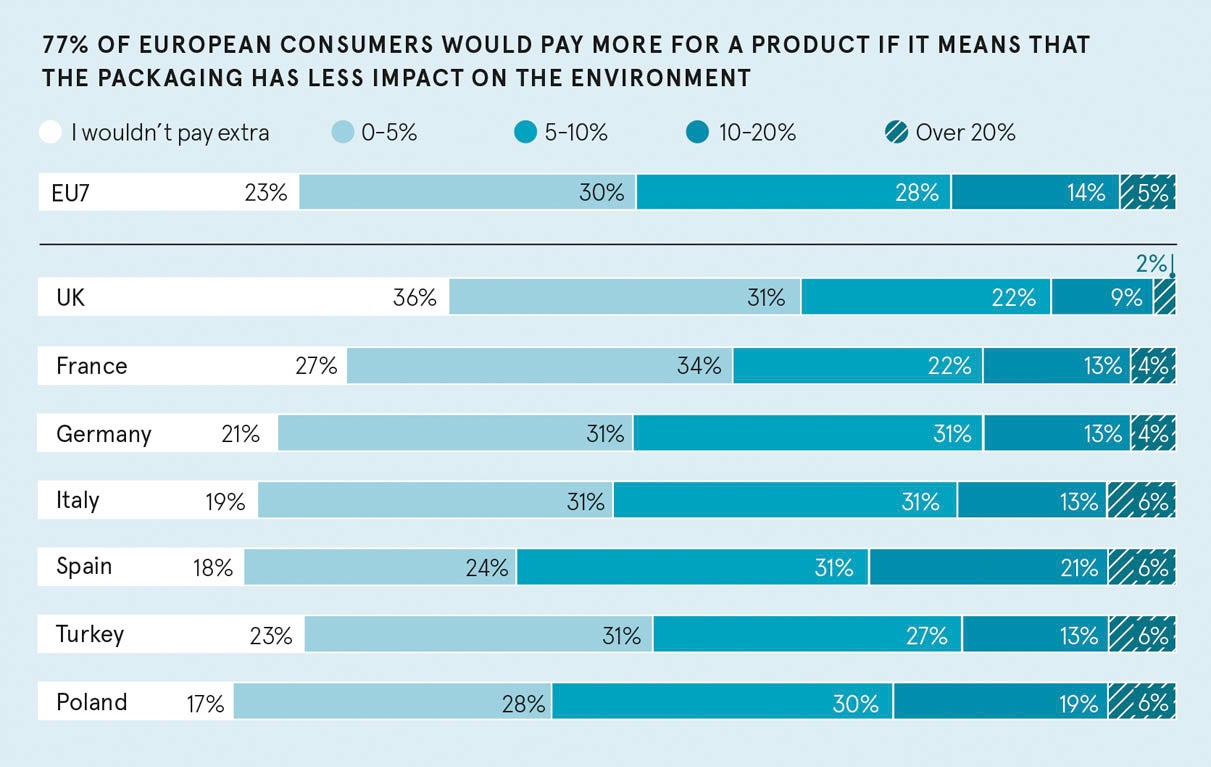In the wake of Swedish activist Greta Thunberg’s dramatic visit to the UK, mass protests by schoolchildren and Sir David Attenborough’s new hard-hitting documentary on climate change, in which he talks of “a man-made disaster of a global scale”, many brands are wondering how to react. Should they switch to sustainable materials? And if so, to what?
New research by Pro Carton, the European Association of Carton and Cartonboard Manufacturers, sets out the facts on consumer attitudes to eco-friendly packaging. It polled 7,000 citizens across seven countries to discover the best course of action.
The headline is that consumers really are demanding a change. More than two thirds of consumers say environmental issues are now “more important” than five years ago. And they are translating this concern into buying decisions. Three-quarters factor in the environmental qualities of packaging when making a purchase. Half of European consumers have switched brands over packaging.
Environmental sentiment is so strong that European consumers are willing to pay more for sustainable packaging, with nearly four out of five saying they are prepared to pay a premium. How much more? These are some of the strongest findings of all: 30 per cent would pay up to 5 per cent more, an additional 28 per cent would pay up to 10 per cent more and 5 per cent are willing pay more than 20 per cent more if the packaging is eco-friendly.
More than half of consumers support the use of taxation to force brands and retailers to switch to eco-packaging, with only 7 per cent objecting. Once radical views are now mainstream.
And what do consumers consider the ideal material for packaging? The survey shows the preferred choice is cartonboard or cardboard. In Germany, 87 per cent of consumers would choose these materials over plastic and 85 per cent in the UK.
“Our survey shows the strength of consumer feeling,” says Tony Hitchin, general manager of Pro Carton. “Consumers care deeply about the impact of packaging on the goods they buy and are prepared to pay more for goods with sustainable packaging.”
Jon Clark, general manager of BPIF Cartons, agrees and says it should be a wake-up call for brands. “We see consumers are making buying decisions based on packaging. Using plastic could be costing you revenue,” he says.
“For example, Easter eggs used to come packed in a plastic shell. Now the plastic has largely gone. In that example, being more environmentally friendly probably saved brands money and made the product more appealing. Similarly, the fast food market has moved more into cartonboard and we’re seeing drinks’ manufacturers replacing the plastic multi-pack rings with cartons which add to the product’s presentation.”
Mr Hitchin adds that it is encouraging to see consumers understand the merits of cartonboard. “Our members’ products mainly come from European forests. These are highly sustainable, since the annual growth of new wood vastly exceeds the amount harvested. Cartonboard is recyclable and biodegradable. It’s fantastic that European consumers are well informed and see cartonboard as the best option,” he says.
More work can be done. The Pro Carton survey shows 90 per cent of consumers want more information on packaging to help buyers make informed choices. This view is so strong that 71 per cent of consumers want the government to impose regulation effecting this.
Brands that take the lead can enjoy a halo effect. “Moving from plastic to cartons can help reposition a brand towards the premium end of the market,” says Mr Clark. “Luxury goods, such as perfumes, fine champagnes and whiskies, use cartons to communicate prestige; more everyday brands will also benefit from the positive image that cartons have. We’ve seen brands that move to sustainable packaging materials improve consumer perceptions.”
Sir David Attenborough observed: “Every one of us has the power to make changes and to make them now.” The Pro Carton survey shows consumers will support brands that make the right choices.
The environmental case for cardboard and cartonboard has always existed. Now the commercial case is clear too.
To find out more please visit www.procarton.com and www.bpifcartons.org.uk

